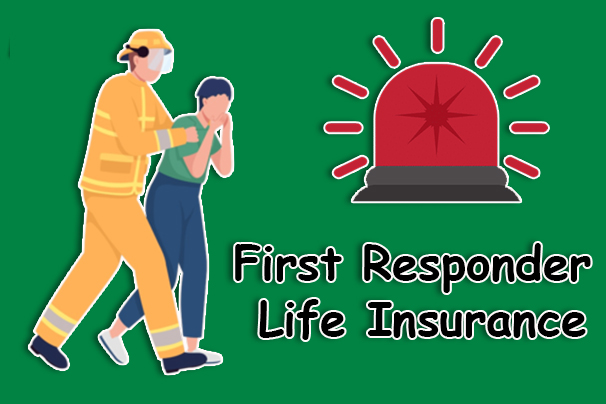We all know that those that risk their lives to protect us like police officers, firefighters, and emergency medical technicians also need to get coverage. Because of the type of job they do, first responders encounter a lot of risks putting their lives at stake. That is why it is important for every first responder to purchase life insurance for their career to cover their family financially for future purposes.

First responder life insurance is a helpful financial coverage for individuals that risk their lives in emergency situations. Additionally, it offers financial coverage to their families, by handling occupational risks. It secures the first responder’s family by supporting in handling the inherent risk. Furthermore, first responder life insurance isn’t an actual policy type but it offers term, whole or universal life insurance to first responders.
Types of First Responder Life Insurance
Life insurance offers different policy types to first responders, each offering a suitable requirement and situations. Generally, a first responder should select between term, whole and universal life insurance.
Term life insurance
This is an easy and affordable policy that provides coverage for a certain amount of time like 10, 20, or 30 years. Also, individuals that are needs coverage for certain financial obligation like a mortgage or child’s tuition fee should consider term life insurance. However, it does not offer long-life coverage or accrue cash value.
Whole life insurance
This kind of insurance provides long-life coverage with extra perks of a cash value component that increases and could be borrowed against in an emergency. It is also the best option for long-term financial conditions regardless its premium is higher than term life insurance. This is because it offers an assured death benefit and a fixed premium cost.
Universal life insurance
Universal life insurance offers suitable choice by permitting you to change premium payments and death benefits. Furthermore, this coverage type also offers cash value component that has interest. It is also beneficial for customers who need to change their coverage financial status over time.
Benefits of First Responder Life Insurance
Since a first responder job involves a certain risk level, life insurance can be considered to be very helpful. The following are some of the most crucial benefits that a full life insurance could provide;
Financial coverage for families
If a first responder pass-away in line of work or not, life insurance can offer financial help to their surviving families in form of a significant sum payment known as death benefit. Death benefit is usually tax-free, and your beneficiaries can use it without any limits. It also covers immediate costs like burial cost and long-term payments like mortgage or college tuition fees.
Covers work-related deaths
One advantage of having first responder life insurance is that it covers all deaths including accidental deaths at work. It offers peace of mind since you are aware that your family would be supported financially. And it would pay for bills that you would normally pay for if you were to pass-away.
Affordable coverage rates provided by employer
Most first responders’ gets life insurance as part of their benefit package as employees. However, group life insurance given by an employer is not enough for numerous individuals. Therefore, you need to have coverage worth five to ten times your annual revenue. This is typically more than you can gain from performing tasks.
Debt settlement
For families, outstanding debts like mortgage or personal loans can be a major problem. However, life insurance can help cover these debts, which will end financial challenges from compounding when you die.
Child tuition fee and future
Life insurance is an important factor in protecting the educational future of a first responder’s child. This coverage can support the child’s dreams and academic aims by including educational funds.
Income replacement
For many families, losing a first responder’s income can be frustrating financially. The family is able to maintain their standard of living and pay for daily expenses thanks to life insurance’s replacement of this income.
Every first responder financial strategy might significantly benefit from life insurance because these careers are high-risk. Also, getting a suitable life insurance for your needs is not only appropriate, but it can also make decision that could protect your family’s future.
How a First Responder Reduces Life Insurance Cost
Generally, first responders perform their duties at dangerous sites, which can increase the cost and difficulty of getting life insurance. However, there are few methods that they can reduce the cost of life insurance premium when getting life insurance.
Keep a healthy lifestyle
Avoid dangerous habits like smoking and consumption of excessive alcohol, regular exercise and balanced diet can reduce the risk if health issues that could increase your premium.
Pick a term life policy
Since term life insurance policies only last for a fixed period, like 10, 20, or 30 year, they are frequently less expensive than whole life policies.
Get only the coverage amount needed
Purchasing the most expensive life insurance can be tempting but there’s a possibility of having too much coverage. To know the amount of coverage you need, apply the life insurance rule of thumb, which is five to ten times your yearly salary. Or, you can use a free online life insurance calculator.
Avoid dangerous activities
Risky activities like bungee jumping and skydiving can raise the cost of life insurance premiums. In addition try to avoid all of these activities if you want your premiums to go down.
Performing your duties as law enforcement, firefighter, first responder offers specific challenges, pleasures, and stress. First responders are similar to everyone else in one important aspect, but if you have financial dependents, you should think about getting life insurance.





